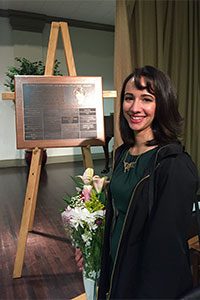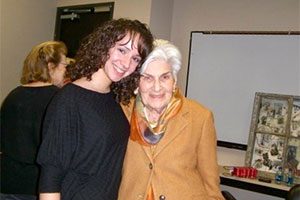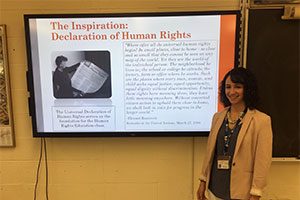 A former Spector/Warren Fellow has been honored for her high school teaching by the Holocaust & Human Rights Education Center in White Plains.
A former Spector/Warren Fellow has been honored for her high school teaching by the Holocaust & Human Rights Education Center in White Plains.
Stephanie Catania’10, a social studies teacher at Somers High School in Westchester County, received the Susan J. Goldberg Memorial Teacher Award, given to a regional educator whose work exemplifies Goldberg’s “passion to eradicate bigotry and hatred,” in April.
The Diary of a Young Girl, by Anne Frank, introduced Catania to the Holocaust when she read it in eighth grade.
“Her story made the Holocaust personal and real to me. When I read about her death at the end, I felt like I lost a good friend,” Catania says.
At Syracuse University, where she majored in secondary education and history, Catania was a Spector/Warren Fellow in 2009, spending a week at the Holocaust Museum in Houston to learn how to bring lessons of the Holocaust into the classroom. The School of Education’s Spector/Warren Fellowship for Future Educators honors Holocaust survivor Naomi Warren, a longtime Houston resident. Her daughter and son-in-law, Helen ’68, G’72 and Andrew Spector ’66, established the fellowship in 2006.
 “The Spector/Warren Fellowship, especially Naomi Warren’s legacy, led me on a journey to teach future generations to never forget the lessons of the Holocaust,” Catania says. She’s blended that experience with other lessons from the School of Education into her teaching style.
“The Spector/Warren Fellowship, especially Naomi Warren’s legacy, led me on a journey to teach future generations to never forget the lessons of the Holocaust,” Catania says. She’s blended that experience with other lessons from the School of Education into her teaching style.
“The most important theory I learned at SOE is creating a safe and respectful learning environment in my classroom. It provides my students a place to be themselves without fear of ridicule or judgment,” she says.
She’s finishing her fifth year at Somers High School. Each year she teaches a Holocaust/Human Rights unit to her 10th-grade Global History students. Included is a research project on human rights violations, in which students usually focus on the Holocaust.
“Students need to research a human rights violation and then create a project that memorializes the event and people that were affected. Students usually create pieces of art that include paintings, sculptures, songs, or poems,” Catania says.
“The top three projects are recognized by the Somers Holocaust Commission’s Yom HaShoah service every year. It is an incredible, rewarding project for both students and teachers and involved.”
Lives like Anne Frank’s make the Holocaust real for students more than 70 years later.
 “Personal stories are always the best way for students to connect with the horrors of the Holocaust,” Catania says. “Typically we discuss with students the choices and roles people take during horrific human rights abuses.
“Personal stories are always the best way for students to connect with the horrors of the Holocaust,” Catania says. “Typically we discuss with students the choices and roles people take during horrific human rights abuses.
“The most important lesson for my students is carry the legacy and voice of the victims and survivors that will not be with us for too long. And to recognize the signs of authoritative rule and the marginalization of people so that history does not repeat itself.”
She says she tries to infuse human rights into most units she teaches and next year will teach a human rights elective for 10th- to12th-grade students.
The Goldberg Memorial Teacher Award honors teachers “who have made distinguished contributions to their school and community on teaching about the Holocaust and other violations of human rights.” And Catania’s honors continue. In July she will participate in the 2017 Echoes and Reflections Advanced Learning Seminar at the Yad Vashem Holocaust History Museum in Jerusalem.
